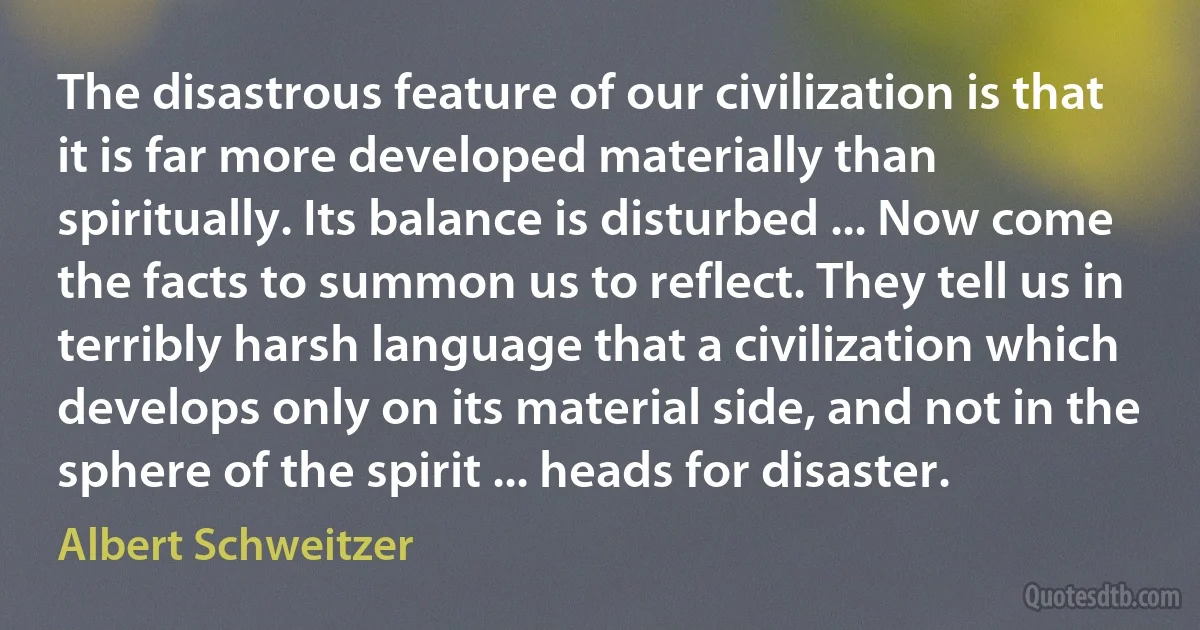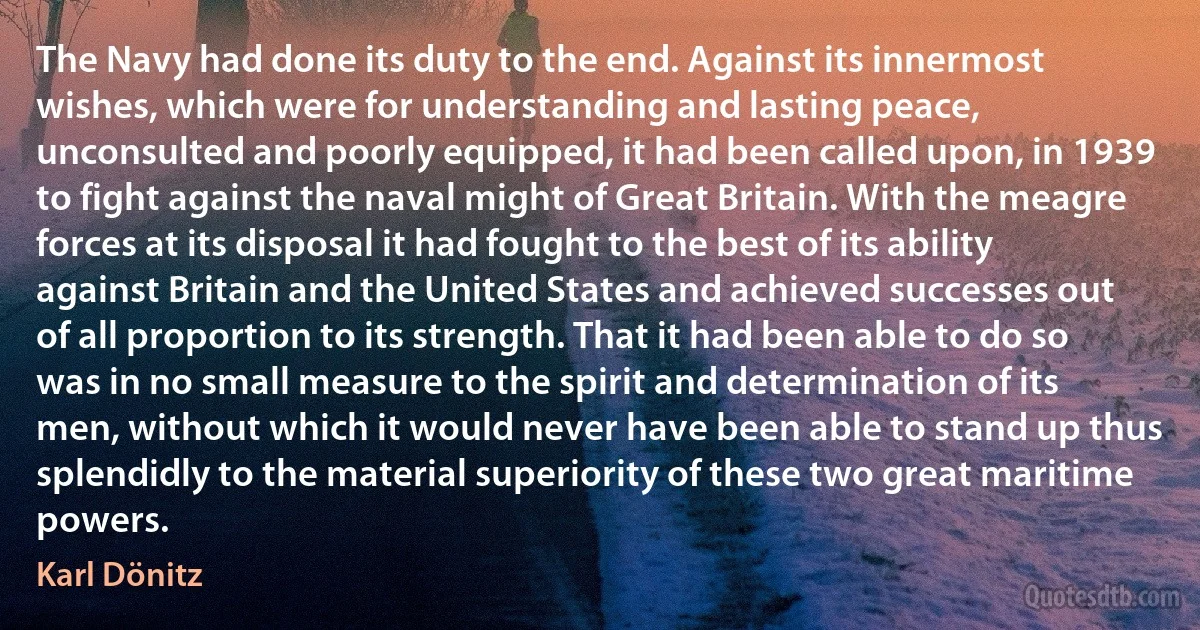Material Quotes - page 86
The progress of science can be said to be harmful to religion only in so far as it is used for evil aims and not because it claims a priority over religion in its revelation to man. It is important that spiritual advancement must keep pace with material advancement. When this comes to be realized man's journey toward higher and more lasting values will show more marked progress while the evil in him recedes into the background. Knowing that material and spiritual progress are essential to man, we must ceaselessly work for the equal attainment of both. Only then shall we be able to acquire that absolute inner calm so necessary to our well-being.
It is only when a people strike an even balance between scientific progress and spiritual and moral advancement that it can be said to possess a wholly perfect and complete personality and not a lopsided one.

Haile Selassie
Do you desire, then, to embrace this life of solitude, and to seek out the blessings of stillness? If so, abandon the cares of the world, and the principalities and powers that lie behind them: free yourself from attachment to material things, from domination by passions and desires, so that as a stranger to all this you may attain true stillness.

Evagrius Ponticus
Rucker sings of loss and despair as if they've left him shell-shocked. But Hootie -- born at frat parties and still a bar band at heart -- know how to deliver beers-and-tears material, and the occasional anti-racist slam, with a smile. The same sly grin crept into songs of frustration -- country writer Radney Foster's "A Fine Line" and the Who's "I Can't Explain." But Rucker is no more Charley Pride than Bryan is Pete Townshend.

Darius Rucker
Why do reporters have to dig into people's privacy?” she fumed.
"Communication is much like sex.”
This set her back. "I don't understand...”
A chuckle. "Being celibate is often wise and prudent. People know this, but the inborn drive to reproduce makes their organs wag. Keeping silent is often wise and prudent. People know this, also, but the drive to question and tell makes their tongues wag. Sex spreads genetic material, good and bad; prying spreads information, true and false; natural selection takes over and both ethical failings contribute to continuing evolution.

Sheri S. Tepper
And you cannot imagine the excitement when I came to be cast with her in Sunil Dutt's 'Reshma Aur Shera'. It was like an unbelievable dream. The Rajasthan location of Jaisalmer and the hot deserts beyond that in the village of Pochina merely a few meters away from the Pakistan border. The arduous drive for hours into the interiors without any navigation and roads. Miles and miles of barren dessert and dunes with a scarcity of every possible material good, required for survival.

Waheeda Rehman
Max Beer, in his History of British Socialism, points out that Bacon looked for the happiness of mankind chiefly in the application of science and industry. But by now it is plain that if this alone were sufficient, we could all live in heaven tomorrow. Beer points out that More, on the other hand, looked to social reform and religious ethics to transform society; and it is equally plain that if the souls of men could be transformed without altering their material and institutional activities, Christianity, Mohammedanism, and Buddhism might have created an earthly paradise almost any time this last two thousand years. The truth is, as Beer sees, that these two conceptions are still at war with each other: idealism and science continue to function in separate compartments; and yet "the happiness of man on earth" depends upon their combination.

Lewis Mumford
I don't have a problem with guilt about money. The way I see it is that my money represents an enormous number of claim checks on society. It is like I have these little pieces of paper that I can turn into consumption. If I wanted to, I could hire 10,000 people to do nothing but paint my picture every day for the rest of my life. And the GNP would go up. But the utility of the product would be zilch, and I would be keeping those 10,000 people from doing AIDS research, or teaching, or nursing. I don't do that though. I don't use very many of those claim checks. There's nothing material I want very much. And I'm going to give virtually all of those claim checks to charity when my wife and I die.

Warren Buffett
The rich world likes and wishes to believe that someone, somewhere, is doing something for the Third World. For this reason, it does not inquire too closely into the motives or practices of anyone who fulfills, however vicariously, this mandate. The great white hope meets the great black hole; the mission to the heathen blends with the comforting myth of Florence Nightingale. As ever, the true address of the missionary is to the self-satisfaction of the sponsor and the donor, and not to the needs of the downtrodden. Helpless infants, abandoned derelicts, lepers and the terminally ill are the raw material for demonstrations of compassion. They are in no position to complain, and their passivity and abjection is considered a sterling trait. It is time to recognize that the world's leading exponent of this false consolation is herself a demagogue, an obscurantist and a servant of earthly powers.

Christopher Hitchens
If you take a glass bottle and toss it up into the air so that when it hits the earth it shatters against the ground, and then you take the shards and glue them back together in the shape of a bird, then you no longer have a bottle, you've made something new. Any parts of my personal history I use in my fiction are only interesting to me as the rawest of raw material that I'm shaping into the form of a bird.

Rion Amilcar Scott
As a guide to engineering ethics, I should like to commend to you a liberal adaptation of the injunction contained in the oath of Hippocrates that the professional man do nothing that will harm his client. Since engineering is a profession which affects the material basis of everyone's life, there is almost always an unconsulted third party involved in any contact between the engineer and those who employ him - and that is the country, the people as a whole. These, too, are the engineer's clients, albeit involuntarily. Engineering ethics ought therefore to safeguard their interests most carefully. Knowing more about the public effects his work will have, the engineer ought to consider himself an "officer of the court” and keep the general interest always in mind.

Hyman G. Rickover
The "national interest" is not a geographical term, except for fairly prosaic matters like trade and environmental regulation. A smaller nation might appropriately feel that its national interest begins and ends at its borders, so that its foreign policy is almost always in a defensive mode. A larger nation has more extensive interests. And large nations, whose identity is ideological, like the Soviet Union of yesteryear and the United States of today, inevitably have ideological interests in addition to more material concerns. Barring extraordinary events, the United States will always feel obliged to defend, if possible, a democratic nation under attack from nondemocratic forces, external or internal. That is why it was in our national interest to come to the defense of France and Britain in World War II. That is why we feel it necessary to defend Israel today, when its survival is threatened. No complicated geopolitical calculations of national interest are necessary.

Irving Kristol
The phase of thought or feeling which we call Mysticism has its origin in that which is the raw material of all religion, and perhaps of all philosophy and art as well, namely, that dim consciousness of the beyond, which is part of our nature as human beings. Men have given different names to these "obstinate questionings of sense and outward things." We may call them, if we will, a sort of higher instinct, perhaps an anticipation of the evolutionary process; or an extension of the frontier of consciousness; or, in religious language, the voice of God speaking to us. Mysticism arises when we try to bring this higher consciousness into relation with the other contents of our minds.

William Ralph Inge
Man's social practice is not confined to activity in production, but takes many other forms--class struggle, political life, scientific and artistic pursuits; in short, as a social being, man participates in all spheres of the practical life of society. Thus man, in varying degrees, comes to know the different relations between man and man, not only through his material life but also through his political and cultural life (both of which are intimately bound up with material life). Of these other types of social practice, class struggle in particular, in all its various forms, exerts a profound influence on the development of man's knowledge. In class society everyone lives as a member of a particular class, and every kind of thinking, without exception, is stamped with the brand of a class.

Mao Zedong
Art on the other hand speaks to us of resignation and rejoicing in reality, and does so through a transformation of our experience of the world into an order wherein all facts become joyous; the more terrible the material the greater the artistic triumph. This has nothing at all to do with "a constant awareness of the problems of our time" or any other vague public concern. It is a transformation that is mysterious, personal and ethical. And the moral effect of art is only interesting when considered in the particular. For it is always the reality of the particular that provides the occasion and the spring of art - it is always "those particular trees/ that caught you in their mysteries" or the experience of some loved object. Not that the matter rests here. It is the transcendent imagination working on this material that releases the mysterious energies which move and speak of deepest existence.

Patrick Swift
The true Christian is not obliged to renounce the things of this world or to lessen his natural abilities. On the contrary, inasmuch as he incorporates them into his normal life in a disciplined manner, he develops and perfects them; he thereby ennobles the natural life itself, supplying efficacious values to it not only of the spiritual and eternal world but also of the material and earthly world.

Edith Stein
The knowledge of anything, since all things have causes, is not acquired or complete unless it is known by its causes. Therefore in medicine we ought to know the causes of sickness and health. And because health and sickness and their causes are sometimes manifest, and sometimes hidden and not to be comprehended except by the study of symptoms, we must also study the symptoms of health and disease. Now it is established in the sciences that no knowledge is acquired save through the study of its causes and beginnings, if it has had causes and beginnings; nor completed except by knowledge of its accidents and accompanying essentials. Of these causes there are four kinds: material, efficient, formal, and final.

Avicenna
Every man lives in two realms, the internal and the external. The internal is that realm of spiritual ends expressed in art, literature, morals, and religion. The external is that complex of devices, techniques, mechanisms, and instrumentalities by means of which we live. Our problem today is that we have allowed the internal to become lost in the external. We have allowed the means by which we live to outdistance the ends for which we live. So much of modern life can be summarized in that arresting dictum of the poet Thoreau: "Improved means to an unimproved end". This is the serious predicament, the deep and haunting problem confronting modern man. If we are to survive today, our moral and spiritual "lag" must be eliminated. Enlarged material powers spell enlarged peril if there is not proportionate growth of the soul. When the "without" of man's nature subjugates the "within", dark storm clouds begin to form in the world.

Martin Luther King Jr.



